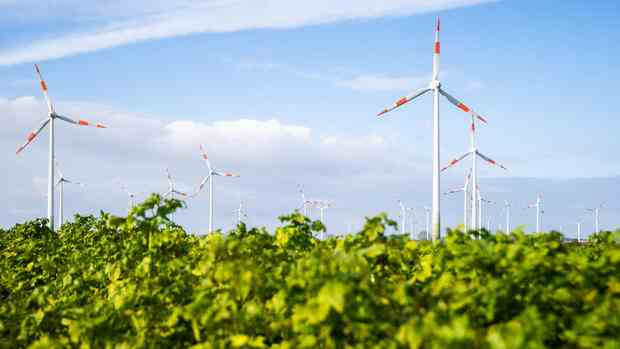The EU is lagging behind when it comes to its own climate targets.
(Photo: dpa)
The anti-inflation law “Inflation Reduction Act (IRA)” is not only intended to accelerate the reduction of greenhouse gas emissions in the USA. State subsidies for companies are primarily intended to ensure American technology leadership in future areas such as hydrogen production. The IRA is an instrument to boost US geopolitical ambitions with additional public spending.
How should Europe react to this? An arms race with green subsidies cannot be the goal. Rather, the EU Member States’ response to this challenge should involve the long-term development of new European financing instruments for investments in order to strengthen Europe’s strategic autonomy in times of great geopolitical uncertainty.
With additional investments, paid for through a permanent EU funding instrument, the long-term competitiveness of European industry could be strengthened. To do this, decarbonization would have to be promoted and the infrastructure expanded.
In a recent study entitled “RRF 2.0”, Andreas Lichtenberger and I argue that a permanent EU investment fund of at least one percent of the EU’s economic output should be set up every year in order to achieve climate and energy goals and to create sustainable economic structures carry. The forthcoming reform of the EU budget rules will not give national governments enough leeway to do this from their own budgets.
To finance the new EU investment fund, the EU Commission would issue bonds – modeled on the Corona recovery fund “Next Generation EU”. Member States would not be individually liable for EU bonds; liability would remain with the EU.
More Handelsblatt articles on the IRA:
The use of the investment funds by the Member States would be tied to them pursuing climate and energy goals. An improvement in the transport and energy infrastructure could strengthen the future viability of the industry. National budgets would be relieved and Europe’s financial stability would be increased through the issuance of safe bonds, which could also be bought by pension funds and insurance companies.
Philipp Heimberger is an economist at the Vienna Institute for International Economic Studies (WIIW).
A permanent EU investment fund for climate and energy would not only strengthen the community of EU member states economically and politically from within, but also promote their future geostrategic ability to act vis-à-vis Russia, China and the USA.
In order to master the geostrategic challenges of our time, European sovereignty should be strengthened through strategic investments with a common financing instrument.
More: EU Column: EU plans half response to half IRA.
